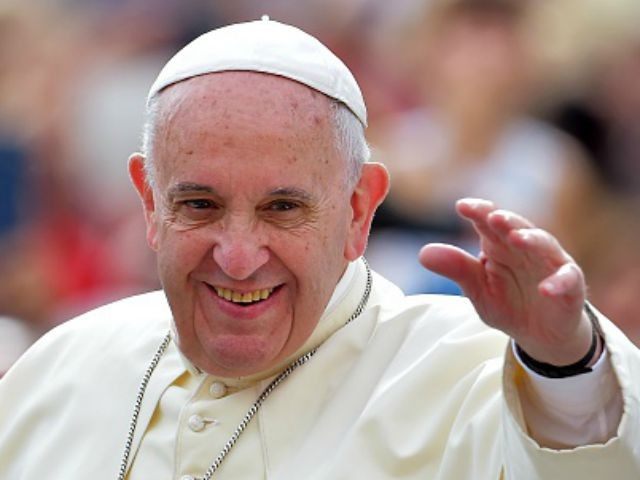In a meeting with environment ministers of the European Union, Pope Francis urged the adoption of UN sustainable development goals later this month as well as intensified preparation for the “COP21” in Paris.
“I strongly encourage you to intensify your work, along with that of your colleagues, so that we arrive at the desired result in Paris,” Francis said.
The Pope also guaranteed to his listeners the support of the Holy See. “You can count on my support and that of the Holy See to respond adequately to both the cry of the Earth and the cry of the poor,” he said.
The Conference of Parties (COP) had its beginning at the Rio Earth Summit in 1992, when the “Rio Convention” adopted the UN Framework on Climate Change (UNFCCC) and set out a framework for action aimed at stabilizing atmospheric concentrations of greenhouse gases to avoid “dangerous anthropogenic interference with the climate system.”
The main objective of the yearly Conference of Parties is to review the Convention’s implementation.
Many of the Pope’s remarks were uncontroversial, such as his declaration that “the environment is a collective heritage of all humanity, and the responsibility of each of us.”
He also stated that the people who are most vulnerable to environmental degradation are the poor, since they suffer the most serious consequences. Pope Francis had ongoing personal experience of this during his ten years of work as archbishop of Buenos Aires, which has a large population of indigent people who suffer disproportionately from the rampant pollution of the area.
Buenos Aires is home to one of the most severely polluted spots on the entire planet: the infamous Riachuelo Basin. The river is included in the list of the top ten worst polluted sites on earth by the environmental organization the Blacksmith Institute, as well as the Cruz Verde Suiza.
The banks of the Riachuelo Basin in Argentina are lined by nearly 4,000 factories, 42 garbage dumps, and 13 slums, with an average of 82,000 cubic meters of industrial waste dumped into the river daily. This has resulted in an unsavory ecological cocktail of unchecked pollution with its related illnesses and curtailed life expectancy, especially among the poor.
“The Riachuelo can be seen as a microcosm of the environmental problems in the cities of Argentina,” says Leandro García Silva, an ombudsman specializing in environmental human rights. “The Riachuelo as a river is absolutely overloaded with contamination as compared with its size—it’s a small river with a big city around it.”
In his address Wednesday, Pope Francis called for solidarity with the poor by implementing effective tools to fight environmental degradation. One way, he said, is by developing and sharing efficient technologies, to maximize the output of human, natural, social and economic resources.
More controversially, Francis spoke of an “ecological debt” that he sees as existing between North and South, “connected to trade imbalances with consequences in the context of ecology, as well as the disproportionate use of natural resources historically made by some countries.”
The Pope called on wealthier nations in the north “to contribute to liquidating this debt by setting a good example in limiting the consumption of non-renewable energy” as well as by assisting poorer countries in programs for sustainable development and by addressing the “serious problem” of food waste while encouraging new attitudes and lifestyles.
Francis said that “science and technology put into our hands unprecedented power” but that the proper use of this power “requires the adoption of a more integral and integrating vision.”
In a response to Francis’ push for UN climate change goals, The Federalist published an essay by Craig D. Idso, the founder of the Center for the Study of Carbon Dioxide and Global Change, in which he challenged the Pope’s claim that there is a “solid scientific consensus” that human activities are causing a “disturbing warming” of the climate.
Idso said it was striking that none of the computer models upon which this vision is based managed to predict the current plateau in global temperature that has continued for the last two decades, despite an 8 percent increase in atmospheric CO2. Such unpredictability highlights the radical unreliability of such models, he said.
The essay also underscored the many positive benefits of atmospheric CO2, which is necessary for plants in the process of photosynthesis to build their tissues and grow. The more CO2 there is in the air, Idso declared, the better plants grow. “They produce greater amounts of biomass, become more efficient in using water, and are better able to cope with environmental stresses such as pollution, drought, salinity, and high temperatures.”
Idso also challenged the Pope’s supposition the best way to help the global poor is through a reduction in carbon emissions, and particularly by limiting the use of fossil fuels.
At a time when half the global population experiences limited access to the energy it needs for the most basic of human needs, including the production of clean water, heating, and light, Idso contended, does it make sense for society to turn its back on these individuals and deny them the right to increase their energy and fossil fuel use?
“It is reprehensible to even consider such an action and it is certainly morally wrong to do so. The world needs more energy, not less,” Idso wrote.
As the UN Conference on Sustainable Development approaches, Pope Francis is provoking the sort of debate that he asked for in his encyclical letter on responsibility for the environment, Laudato Sì.
He has said that he welcomes all voices in this debate, and he is getting them.
Follow Thomas D. Williams on Twitter @tdwilliamsrome

COMMENTS
Please let us know if you're having issues with commenting.